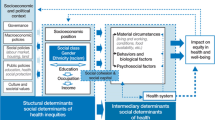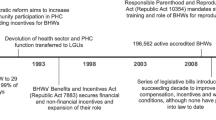Abstract
SETTING: Since the year 2003, most countries of the Region of the Americas have experienced sustained economic growth and inclusive development policies. In the health sector, achieving universal access became the overarching goal. However, the structural limitations of the health workforce represented a formidable obstacle to change. National Health Authorities were confronted with the challenge of developing critical capacities to redress entrenched inequalities in access to qualified health personnel.
INTERVENTION: Under the auspices of the Pan American Health Organization, the Ministers of Health of the Region adopted, in September 2007, twenty regional goals for Human Resources for Health 2007–2015, aligned with the renewed strategy of Primary Health Care. Subsequently, a set of indicators and a methodology were developed to assess the goals and to monitor progress at the country level.
OUTCOMES: Fifteen countries carried out a baseline assessment in 2009 or 2010 and conducted a second assessment in 2013. Although differences were noted across goals and between countries, the results suggested improvements in all twenty goals overall. The goals linked to the distribution of personnel, the management of migration, and the cooperation with education institutions appeared to be more resilient to change.
IMPLICATIONS: The twenty Regional Goals for Human Resources for Health provided a common vision for action and a framework for cooperation within and among countries, and was a catalyst for change. Faced with evolving challenges, the countries should consider adopting a new shared agenda that builds on progress made and further supports intergovernmental policy alignment and capacity building in health workforce development, governance and management.
Résumé
LIEU: Depuis 2003, la plupart des pays de la Région des Amériques connaissent une croissance économique soutenue et ont adopté des politiques de développement axées sur l’inclusion. Dans le secteur de la santé, l’accès universel est devenu l’objectif primordial. Les contraintes structurelles des personnels de santé ont cependant représenté un obstacle formidable au changement. Les autorités sanitaires nationales ont été confrontées à la difficulté de renforcer les capacités critiques pour redresser les inégalités enracinées face à l’accès aux personnels de santé qualifiés.
INTERVENTION: Sous les auspices de l’Organisation panaméricaine de la Santé, les ministres de la Santé de la région ont adopté, en septembre 2007, vingt objectifs régionaux liés aux Ressources humaines pour la santé 2007–2015, qui correspondent à la stratégie des Soins de santé primaires renouvelée. Par la suite, on a élaboré un jeu d’indicateurs et une méthode pour évaluer les objectifs et surveiller les progrès accomplis dans chaque pays.
RÉSULTATS: Quinze pays ont mené une évaluation préliminaire en 2009 ou 2010 et une seconde évaluation en 2013. Malgré les différences constatées entre les objectifs et d’un pays à l’autre, les résultats suggèrent une amélioration pour l’ensemble des vingt objectifs. Ceux qui étaient liés à la répartition des personnels, à la gestion des migrations et à la coopération avec les établissements d’enseignement se sont avérés plus réfractaires au changement.
IMPLICATIONS: Les vingt objectifs régionaux liés aux Ressources humaines pour la santé ont offert une vision commune des mesures à prendre et un cadre de coopération à l’intérieur des pays et entre eux; ils ont de ce fait été des catalyseurs de changement. Confrontés à des défis mouvants, les pays devraient considérer l’adoption d’un nouveau plan d’action commun qui s’appuie sur les progrés accomplis et qui promeut l’harmonisation des politiques intergouvernementales et le renforcement des capacités de développement, de gouvernance et de gestion des personnels de santé.
Similar content being viewed by others
References
Programa de las Naciones Unidas para el Progreso (PNUD). Progreso multidimensional: bienestar mas allá del ingreso. Informe regional sobre Desarrollo Humano para América Latina y el Caribe, Resumen ejecutivo. New York, NY, 2016. Available at: http://www.cl.undp.org/content/dam/ rblac/docs/Research%20and%20Publications/IDH/UNDP_RBLAC_IDH2016Final.pdf (Accessed September 8, 2016).
Pinto EC. Latin America in the first decade of the XXI century: The “China Effect” and growth with inclusion. In: Rodriguez VA, Nogueira RP (Eds.), International Observatory of Human Capabilities, Development and Public Policy: Studies and Analysis. Brasilia, Brazil: UNB/ObservaRH/NESP, 2013; 23–45.
Health Agenda for the Americas 2008–2017. Panama City, FL: Ministers of Health of the Americas, 2008. Available at: http://new.paho.org/hq/dmdocuments/2009/Health_Agenda_for_the_Americas_2008-2017.pdf (Accessed August 14, 2016).
Pan American Health Organization. Primary Health Care in the Americas: Lessons Learned Over 25 Years and Future Challenges. CD44/9. Washington, DC, 2003. Available at: http://wwwl.paho.org/english/gov/cd/cd44-09-e.pdfle (Accessed July 18, 2016).
Pan American Health Organization. Regional declaration on the new orientations for primary health care (declaration of Montevideo). 46th Directing Council, Washington, DC, 2005. Available at: http://www1.paho.org/hq/dmdocuments/2010/PHC_CD46-Declaration_Montevideo-2005.pdf (Accessed July 18, 2016).
Chen L, Evans T, Anand S, Boufford JI, Brown H, Chowdhury M, et al. Human resources for health: Overcoming the crisis. Lancet 2004;364:1984–90. PMID: 15567015. doi: 10.1016/S0140-6736(04)17482-5.
Cameron R. Health Human Resources Trends in the Americas: Evidence for Action. Washington, DC: Pan American Health Organization, 2006.
The Nurse Labor and Education Markets in the English-Speaking CARICOM: Issues and Options for Reform. Report No. 48988-LAC. Washington, DC: World Bank, 2009.
Pan American Health Organization. Toronto Call to Action, Towards a Decade of Human Resources in Health for the Americas. Washington, DC, 2005. Available at: http://www.bvsde.paho.org/bvsdeescuelas/fulltext/CallAction_engl.pdf (Accessed August 25, 2016).
Pan American Health Organization. Regional Goals for Human Resources for Health 2007–2015. CSP27/10. Washington, DC: PAHO, 2007.
Pan American Health Organization. Handbook for Measurement and Monitoring Indicators of the Regional Goals for Human Resources for Health. Washington, DC: PAHO, 2011.
Ministerio de Salud de Perú. Segunda Medición de las Metas Regionales de Recursos Humanos para la Salud Perú 2007–2015. Available at: http://observatoriorh.org/?q=informes-finales-de-pais-de-la-segunda-medicion-de-metas-regionales-en-rhus-2013 (Accessed June 26, 2016).
The World Health Report 2006: Working Together for Health. Geneva, Switzerland: WHO, 2006.
Dal Poz MR, Sepulveda HR, Costa Couto MH, Godue C, Padilla M, Cameron R, et al. Assessment of human resources for health programme implementation in 15 Latin American and Caribbean countries. Hum Resources Health 2015;13:24. PMID: 25928346. doi: 10.1186/sl2960-015-0016-4.
Global Health Workforce Alliance–Working Group #1. Economic, Demographic, and Epidemiological Transitions and the Future of Health Labor Markets, 2014. Available at: http://www.who.int/workforcealliance/media/news/2014/WG1_SynthesisSept282014.pdf (Accessed June 16, 2016).
United Nations General Assembly. Transforming Our World: The 2030 Agenda for Sustainable Development. Resolution A/RES/70/1, United Nations, New York, 2015.
World Health Organization. Global strategy on human resources for health: Workforce 2030. DRAFT for the 69th World Health Assembly, Geneva, Switzerland: WHO, 2016.
Author information
Authors and Affiliations
Corresponding author
Additional information
Conflict of Interest: None to declare.
Rights and permissions
About this article
Cite this article
Godue, C., Cameron, R. & Borrell, R.M. Capacity building in human resources for health: The experience of the region of the Americas. Can J Public Health 107, e347–e354 (2016). https://doi.org/10.17269/CJPH.107.5564
Received:
Accepted:
Published:
Issue Date:
DOI: https://doi.org/10.17269/CJPH.107.5564
Key words
- Human Resources for Health
- capacity building
- Latin America
- health policy
- governance
- evaluation and monitoring




